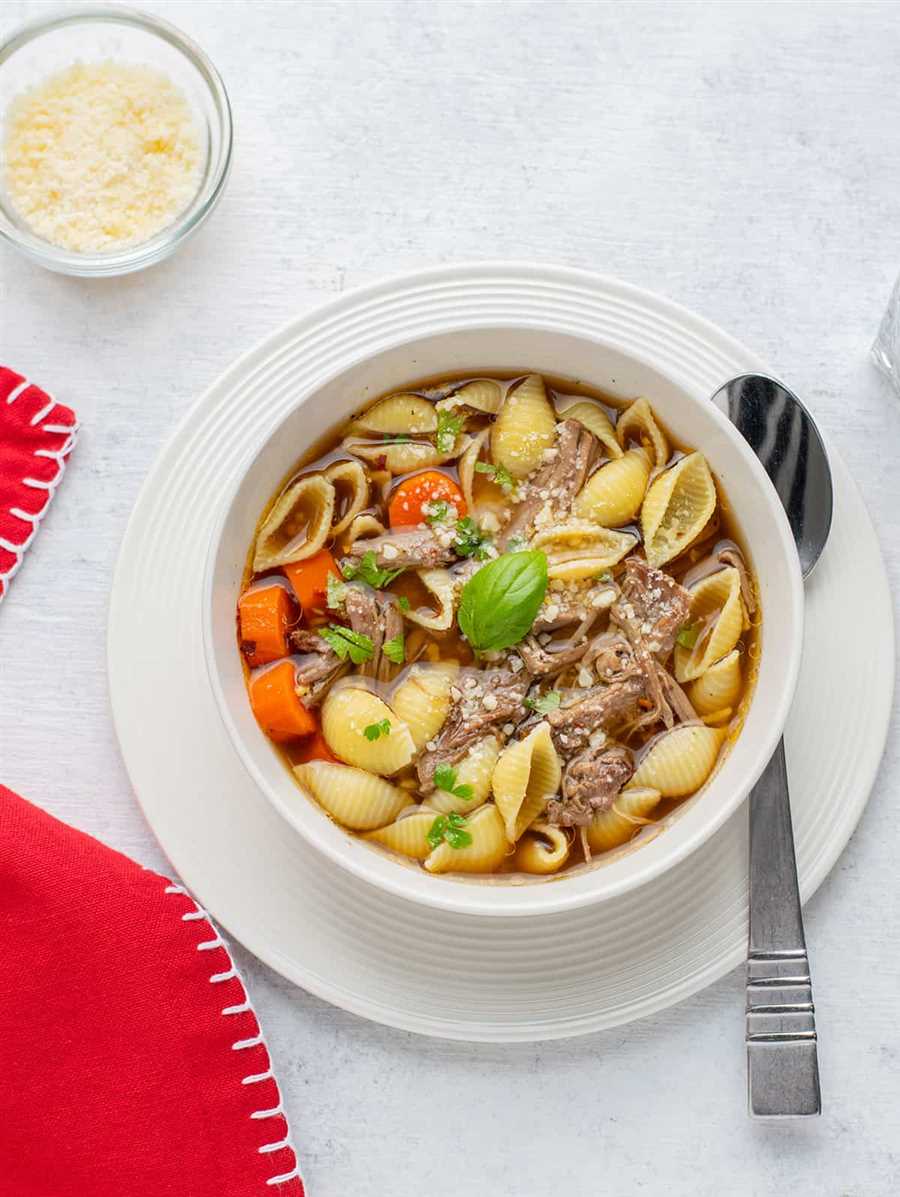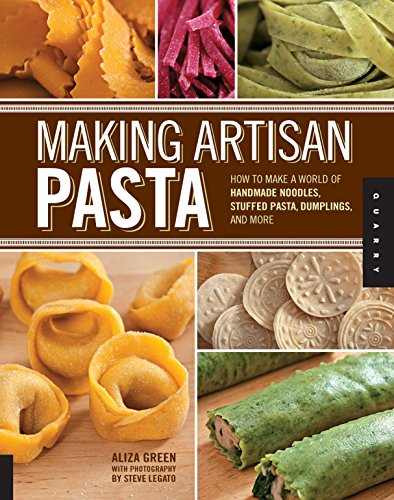Many people wonder if it’s possible to cook pasta in soup.
Traditionally, pasta is cooked separately and then added to hot soup before serving. However, some recipes call for pasta to be cooked directly in the soup.
There are a few important things to consider when cooking pasta in soup.
Firstly, the type of pasta you choose makes a difference. Thin pasta, such as angel hair or thin spaghetti, can be cooked directly in the soup without much trouble. However, thicker pasta like penne or rigatoni may need longer cooking times and could absorb more liquid, making the soup too thick or starchy.
Secondly, the cooking time is crucial. If you decide to cook pasta directly in the soup, keep in mind that it will continue to cook even after removing it from the heat. To prevent overcooking, you can slightly undercook the pasta before adding it to the soup, especially if you plan to reheat the soup later.
Can You Cook Pasta in Soup: All You Need to Know
If you are a fan of pasta and soup, you might be wondering if you can cook pasta directly in the soup. The answer is yes, you can cook pasta in soup, and it can be quite delicious. However, there are a few things you need to keep in mind to ensure that your pasta turns out perfect.
Types of Pasta to Use
When cooking pasta in soup, it’s important to choose the right type of pasta. Some types of pasta, such as small shapes or thin varieties, work best in soups because they cook quickly and evenly. Common choices include small shells, macaroni, orzo, and small tortellini. These types of pasta can absorb the flavors of the soup and provide a satisfying bite.
Cooking Time and Techniques
To cook pasta in soup, you’ll need to adjust the cooking time and technique slightly. It’s best to cook the pasta directly in the soup instead of boiling it separately. This allows the pasta to absorb the flavors of the soup and become tender. However, you need to be cautious not to overcook the pasta, as it can become mushy.
Start by bringing the soup to a simmer. Once simmering, add the pasta and stir it occasionally to prevent sticking. Cook the pasta for the specified time mentioned on the pasta package, minus a minute or two. Check the pasta for doneness by tasting it. It should be al dente, which means it should have a slight bite to it.
Another technique is to partially cook the pasta separately and then add it to the soup towards the end of cooking. This can help you control the texture of the pasta better, especially if you’re making the soup ahead of time.
Importance of Liquid and Seasoning
When cooking pasta in soup, it’s essential to have enough liquid to cook the pasta properly. If the soup appears too thick, you can add more broth or water to ensure the pasta has enough liquid to cook in. Remember that the pasta will absorb some of the liquid as it cooks, so having extra liquid is crucial.
Additionally, make sure to season your soup well. As the pasta cooks, it will absorb the flavors of the soup, so it’s important to have a well-seasoned soup to begin with. Taste the soup and adjust the seasoning as needed before adding the pasta.
Conclusion
Cooking pasta in soup is a convenient and delicious way to enjoy both pasta and soup in one dish. By choosing the right type of pasta, adjusting the cooking time and technique, and ensuring enough liquid and seasoning, you can create a satisfying bowl of pasta soup. So go ahead and give it a try!
Cooking Pasta in Soup: A Delicious Combination
When it comes to comfort food, few dishes can rival the combination of pasta and soup. Whether you prefer a hearty tomato soup or a rich chicken broth, adding pasta can take your soup to a whole new level. Not only does it add substance and texture, but it also makes the dish more filling and satisfying.
The Benefits of Cooking Pasta in Soup
There are several benefits to cooking pasta directly in your soup:
- Convenience: Cooking pasta in soup saves time and effort since you can cook both components in the same pot.
- Flavor Infusion: As pasta cooks, it absorbs the flavors of the soup, enhancing the overall taste of the dish.
- Thicker Consistency: The starch released from the pasta thickens the soup, giving it a more robust texture.
Tips for Cooking Pasta in Soup
To ensure your pasta and soup turn out perfectly, here are some tips to keep in mind:
- Choose the right type of pasta: Some pasta shapes work better in soup than others. Small shapes like macaroni, shells, or orzo are ideal as they cook quickly and are easier to eat.
- Don’t overcook the pasta: Since the pasta will continue to cook in the hot soup, it’s best to undercook it slightly to avoid ending up with mushy pasta. Follow the package instructions for cooking times, but reduce it by a minute or two.
- Add pasta at the right time: Depending on the type of pasta you use, add it to the soup during the last 5-10 minutes of cooking. This will ensure that it doesn’t become too soft or overcooked.
- Adjust seasoning: As the pasta absorbs some of the soup’s flavors, you may need to adjust the seasoning before serving. Taste the soup and add salt, pepper, or other spices as needed.
With these tips in mind, you can create a delicious and satisfying pasta soup that is sure to please your taste buds. Whether you’re making a classic minestrone or a creamy chicken noodle soup, cooking pasta in soup is a simple and tasty way to elevate your favorite comfort food.
The Benefits of Cooking Pasta in Soup
When it comes to cooking pasta, there are various methods and recipes to choose from. One popular technique is to cook pasta in soup, which has its own unique advantages. This article will explore the benefits of incorporating pasta into a soup dish.
1. Enhanced Flavor
When pasta is cooked in soup, it absorbs the flavors of the broth, resulting in a more flavorful dish overall. The pasta acts as a sponge, soaking up the delicious seasonings and spices present in the soup. This adds depth and complexity to the taste, making each bite more satisfying.
2. One-Pot Convenience
Cooking pasta in soup eliminates the need for multiple pots and pans, simplifying the cooking process. It allows you to prepare a complete meal in one pot, saving time and reducing cleanup. This makes it an ideal option for busy individuals or those looking for a quick and easy dinner idea.
| Benefits | Description |
|---|---|
| 3. Nutritional Boost | The pasta absorbs the nutrients from the soup, providing a nutritional boost. This ensures that you are getting a well-rounded meal with all the necessary vitamins and minerals. |
| 4. Great for Leftovers | If you have leftover soup with pasta, it can be reheated without losing its texture or taste. The pasta retains its shape and doesn’t become mushy, making it a convenient option for meal prepping or enjoying the dish over multiple days. |
In conclusion, cooking pasta in soup offers a range of benefits, including enhanced flavor, one-pot convenience, nutritional boost, and great leftovers. It’s a versatile and satisfying way to enjoy both pasta and soup in one delicious dish.
Tips for Cooking Pasta in Soup
When it comes to making a delicious soup with pasta, there are a few key tips to keep in mind. Here are some suggestions to ensure your pasta turns out perfectly cooked and flavorful:
Choose the Right Type of Pasta
Not all pasta varieties are created equal. Some types work better in soups than others. Generally, small pasta shapes or broken pieces are preferred as they cook quickly and evenly. Good options include small shells, rotini, or small macaroni.
Cook the Pasta Separately
To prevent your pasta from becoming mushy, it’s best to cook it separately in boiling water according to the package instructions. Once the pasta is al dente, drain it and set it aside. This way, you can control the cooking time and ensure your pasta maintains its desired texture.
Add the Cooked Pasta at the End

Instead of adding the cooked pasta directly to the soup pot, it’s recommended to add it near the end of the cooking process. This will prevent the pasta from overcooking and becoming too soft. Simply stir in the cooked pasta a few minutes before serving to allow it to warm up and absorb the flavors of the soup.
Use the Right Amount of Liquid
When cooking pasta in soup, it’s important to use the right amount of liquid. The pasta will absorb some of the soup broth as it cooks. If you prefer a thicker soup, use less liquid. If you like a more broth-based soup, use a bit more liquid. Adjust the amount of liquid based on your personal preference.
Consider the Cooking Time
The cooking time for the pasta will vary depending on its size and thickness, as well as the type of soup you’re making. Generally, it’s best to slightly undercook the pasta when cooking it separately, as it will continue to cook in the soup. Keep this in mind and adjust the cooking time accordingly to avoid ending up with overcooked pasta in your soup.
Season and Serve
Before serving your soup with pasta, taste and adjust the seasonings as needed. Depending on the flavors in your soup, you may want to add more salt, pepper, or other herbs and spices to enhance the taste. Serve the soup hot and enjoy!
| Ingredients: | Instructions: |
|---|---|
| – Soup broth – Pasta – Vegetables (optional) – Seasonings (optional) |
1. Cook pasta separately according to package instructions. 2. Prepare the soup broth and any vegetables. 3. Add the cooked pasta to the soup pot near the end of the cooking process. 4. Taste and adjust seasonings as needed. 5. Serve hot. |
Questions and answers
Can you cook pasta in soup?
Yes, you can cook pasta in soup. Adding pasta to soup is a great way to make it more filling and to add some extra texture.
What kind of pasta can I use in soup?
You can use any type of pasta in soup, but smaller shapes like macaroni, shells, or orzo work best. They cook quickly and are easy to eat with a spoon.
How do I cook pasta in soup?
To cook pasta in soup, simply add it to the boiling soup and let it cook for the recommended time on the pasta packaging. Stir occasionally to prevent sticking.
Will the pasta get too soggy in the soup?
If you cook the pasta in the soup for the recommended time, it should be perfectly cooked and not too soggy. However, if you prefer your pasta to be more al dente, you can slightly undercook it before adding it to the soup.
Can I prepare the soup with cooked pasta in advance?
If you are planning to prepare the soup in advance, it is best to cook the pasta separately and add it to individual portions when serving. This prevents the pasta from absorbing too much liquid and becoming too soft.
Can I cook pasta in soup?
Yes, you can cook pasta in soup. Adding pasta to soup is a common practice and it can add texture and substance to the dish.






